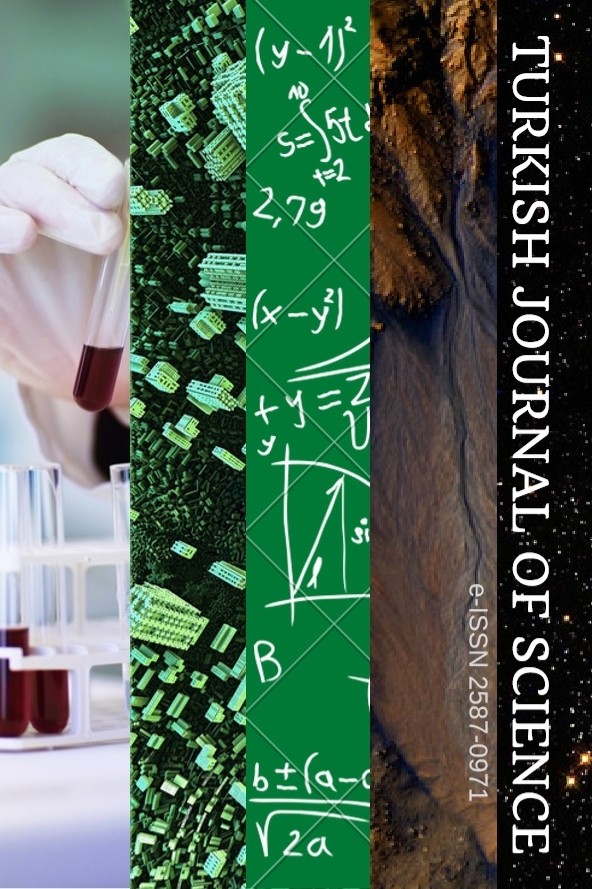Isolation and Identification of Entomopathogenic Bacteria from Some Species of Curculionidae Familia Harmful to Leguminous Forage Plants
Isolation and Identification of Entomopathogenic Bacteria from Some Species of Curculionidae Familia Harmful to Leguminous Forage Plants
Biopesticides, Leguminous forage plants,
___
- Elçi Ş, 2005. Baklagil ve Buğdaygil Yem Bitkileri. TC. Tarım ve Köy İşleri Bakanlığı, Ankara, s 54-56.
- Tan M, Serin Y, 2008. Baklagil Yem Bitkileri. Atatürk Üniversitesi Ziraat Fakültesi Yayınları No: 190, Erzurum, s, 1-3.
- Anonymous, 2002. FAO Agricultural Production, www.fao.org (19.06.2009).
- Bolton J.L, Goplen B.P, Baenziger H, 1972. World Distribution and Historical Developments. Agronomy, 15, 1-34.
- Anonim 2007. TÜİK Tarım Bitkisel Üretim İstatistikleri. www.tuik.gov.tr (19.06.2009).
- Yıldırım E, 2008. Tarımsal Zararlılarla Mücadele Yöntemleri ve Kullanılan İlaçlar. Atatürk Üniversitesi Ziraat Fakültesi Yayınları No:219, s 1, Erzurum.
- Pisarek M, 1995. Influence of the Age of Lucerne (Medicago sativa L.) Plantations Age on the Occurrence of Harmful Weevils (Col. Curculionidae) in the Rzeszow Region. Materiay Sesji Instytutu Ochrony Roslin, 2 (35), 23-25.
- Lykouressıs D.P, Emmanouel N.G, Parentıs AA, 1991. Studıes on Biology and Population-Structure of 3 Curculionid Pests of Lucerne in Greece. Journal of Applıed Entomology-Zeıtschrıft Fur Angewandte Entomologıe, 3 (112), 317-320.
- Vasil'eva T.V, 2004. Pests of non-traditional fodder crops. Zashchita i Karantin Rastenii, 3, 56-57.
- Özbek H, Hayat, R., 2008. Tahıl, Sebze, Yem ve Endüstri Bitki Zararlıları. Atatürk Üniversitesi Ziraat Fakültesi Yayınları No: 340, 179-197, Erzurum.
- Strbac P, 2005. Other important weevils (Curculionidae) of alfalfa and clover. Biljni Lekar (Plant Doctor), 5 (33), 501-508.
- Toshova T.B, Subchev M. A, Atanasova D.I, Velázquez de Castro A.J, Smart L, 2009. Sıtona Weevıls (Coleoptera: Curculıonıdae) Caught by Traps in Alfalfa Fıelds in Bulgaria Bıotechnol. & Bıotechnol. Eq. Specıal Edıtıon/On-Lıne.
- Tamer A, Aydemir M, Has A, 1997. Ankara ve Konya illerinde Korunga ve Yoncada Görülen Zararlı ve Faydalı Böcekler Üzerinde Faunistik Çalışmalar. Bitki Koruma Bülteni, 37 (34), 125-161.
- Kıvan M, 1995. Tekirdağ İlinde Baklagil Yem Bitkilerinde Bulunan Sitona GM (Coleoptera: Curculionidae) Türleri, Konukçuları ve Yayılışları Üzerine Ön Araştırmalar. Türk Entomol.Derg, 19 (4), 299-304.
- Barrad B.I.P, 1996. Sitona Lepidus Gyllenhal (Coleoptera: Curculionidae) , A Potential Clover Pest New to New Zealand. New Zealand Entomologist, vol. 19, 23-29.
- Akkaya A, 1995. Güneydoğu Anadolu Bölgesinde Baklagil Yem Bitkilerinde Entomolojik Sorunlar ve Çözüm Önerileri. GAP Bölgesi Bitki Koruma Sorunları ve Çözüm Önerileri, Şanlıurfa.
- Saygılı H, Şahin F, Aysan Y, 2006. Fitobakteriyoloji. s, 65-75 İzmir-İstanbul-Adana.
- Dhingani M.R., Parakhia M.V, Tomar R. 2013. Functional characterization of PGPR and its identification through 16 S rRNA sequencing. Indian Journal of Applied Research, 3:6, 47-50
- Miller I, Berger T, 1985. Bacteria Identification by Gas Chromatography of Whole Cell fatty acids. Hewlett Packard Gas Chromatography Application Note, Hewlett Packard Co., Alto, CA, 228-238.
- Jackman P.J.H, 1985. Bacterial taxonomy based on electrophoretic whole-cell protein patterns. The Society for Applied Bacteriology, 415-429.
- Kersters K, 1985. Numerical methods in the classification of bacteria protein electrophoresis. Society for General Microbiology, 337-368.
- Miller S.A, Martin R.R, 1988. Molecular Diagnosis of plant disease. Phytopathology, 26, 409-432.
- Guillorit-Rondeau C, Malandrin L, Samson R, 1996. Identification of two serological flagellar types (H1 and H2) in Pseudomonas syringae pathovars. European Journal of Plant Pathology, 102, 99-104.
- Scortichini M, Janse J.D, Rossi M.P, Derks J.H.J, 1996. Characterization of Xanthomonas campestris pv. pruni strains from different host by pathogenicity test and analysis of whole-cell fatty acids and whole-cell proteins. Journal of Phytopathology, 144, 69-74.
- Zhang Y, Geider K, 1997. Differentiation of Erwinia amylovora strains by pulsed-field gel electrophoresis. Applied and Enviromental Microbiology, 63, 4421-4426.
- ISSN: 2587-0971
- Başlangıç: 2016
- Yayıncı: Ahmet Ocak AKDEMİR
The Disinfection of Escherichia coli by Ultraviolet Intensity and Ultrasound Power
On Some Hadamard-Type Inequalities for Product of Two h-Convex Functions On the Co-ordinates
M. Emin ÖZDEMİR, Mohammad Amer LATIF, Ahmet Ocak AKDEMİR
Dissolution of Ulexite in Hydrochloric Acid Solutions
Yaşar GENEL, Fahriye İNCE, Halil DURAK
Hermite-Hadamard type inequalities for s-convex and s-concave functions via fractional integrals
